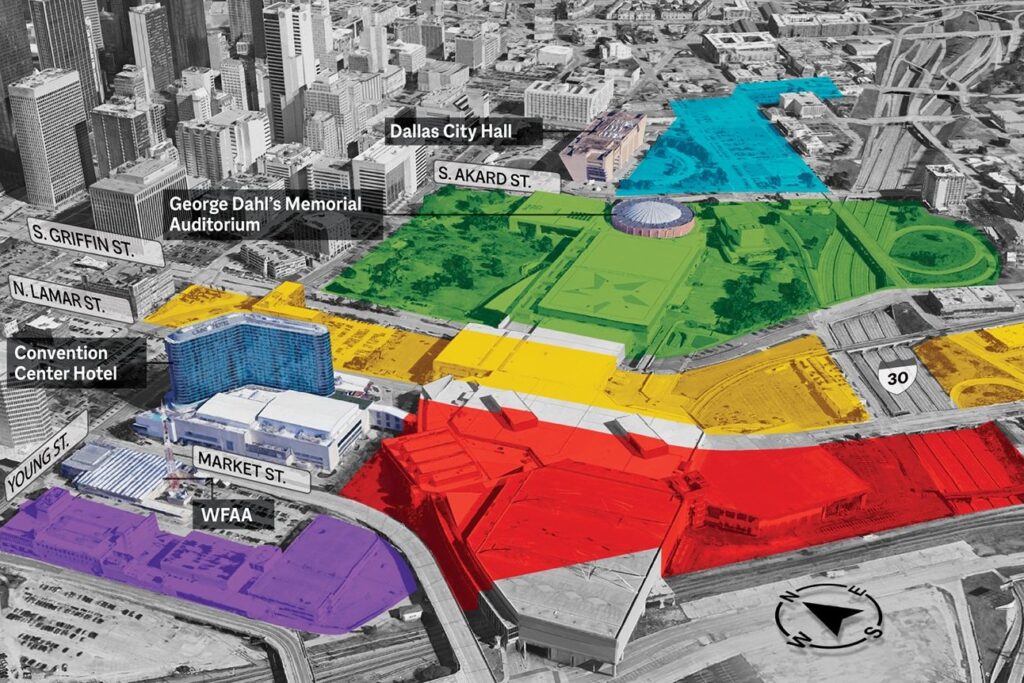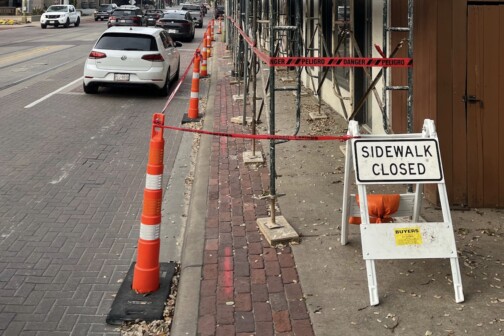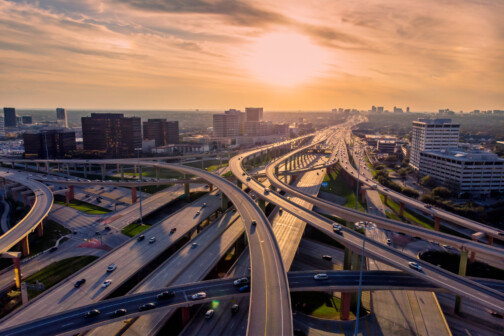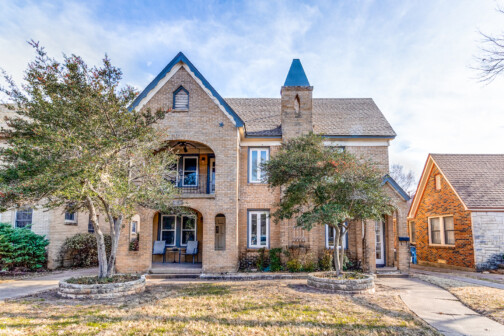By a vote of 14-1, the Dallas City Council instructed staff today to move ahead with a plan to tear down and rebuild the Kay Bailey Hutchison Convention Center. The redevelopment project, which you can read about in detail here, was applauded nearly unanimously by council members. They spoke to its potential for stirring economic development downtown, bridging the city center to South Dallas with a new deck park over Interstate 30, and creating space for new affordable housing.
The $4 billion teardown and rebuild project will be paid for mostly through revenue from state sales and hotel tax. There will be no impact on the city’s general fund; the money used to pay for the project will come from visitors and existing tax revenue that would have otherwise gone to the state. In other words, Dallas residents won’t be footing the bill.
The convention center has been built and rebuilt numerous times during its 70-year history, resulting in a Frankenstein monstrosity surrounded by lifeless parking lots and saddled with a hefty $500 million deferred maintenance bill. The plan is to tear down much of the existing structure and extend the newest portions of the building south across I-30 and into the Cedars. That would open up a large swath of downtown which council members hope can be used for new housing, a hotel, and public green space. Developers around the convention center also hope the public investment will supercharge the revitalization of a long-neglected corner of the city’s core.
In an impassioned speech, West Dallas Councilman Omar Narvaez, who chairs the city’s transportation committee and steered the project to a council vote, praised the redo for what he believes will be “the transformation of downtown Dallas.” He spoke about adding affordable housing, more open space, and potential economic development. The funding mechanisms being used to fund the project will also allow the city to use some of the state’s portion of sales tax to pay for capital improvements at Fair Park, a provision that helped sweeten the deal—and soften political blowback.
“This money that is coming to us will cost us zero out of your general fund—I repeat that: zero,” Narvaez said. “Do we have the guts to transform our city?”
Southern Dallas Council member Tennell Atkins was even more direct.
“This is a no-brainer,” Atkins said. “Every time you get free money from the state of Texas, you better grab it as fast as you can.”
Free money, economic development, affordable housing, deck parks—it seemed the only thing the council wasn’t particularly interested in discussing was the convention business. North Dallas Councilwoman Cara Mendelsohn was the lone voice of skepticism during the debate, pointing out that the city was about to invest $4 billion into a building for a business model that she believes may be questionable.
“We really don’t know what is going to happen in the future of conventions,” Mendelsohn said. “Convention centers weren’t growing before COVID. Now they’re in a different situation.”
Mendelsohn attempted to tap the brakes on the project. After passing an amended motion that would instruct staff to move more slowly in planning than what was dictated in the original resolution, she read a long list of questions and concerns about the project.
Did the city have agreements with DART, the Union Pacific Railroad, and the Texas Department of Transportation, all of whom control right of way in and around the convention center property? Did the public have sufficient opportunities to sound off on how the freed-up space around the convention center could be used? And if the problem with today’s convention center is that the city has long underfunded maintenance, what’s to say the city won’t allow the new building to rot?
“Nobody has explained how the building is so poorly maintained that it is listed as obsolete,” Mendelsohn said. “How did that happen?”
City staff argued that the forthcoming study would hammer out those details. Then the discussion stopped. In a parliamentary twist, Mendelsohn’s protest was cut short after South Dallas/Fair Park Councilman Adam Bazaldua proposed a motion that shut down debate and moved the resolution to a vote.
Torpedoing debate did not impact the overall result. Mendelsohn was the only “no” vote, as most council members echoed Atkins’ opinion that the matter was a “no-brainer.” But what comes next will take lots of brains.
Wednesday’s vote wasn’t the first time the Dallas City Council opined on how a large public investment in a big-ticket civic project was going to solve all of the city’s perennial woes, including affordable housing, public transit, and the vitality of South Dallas.
But the city doesn’t have a great track record of leveraging these kinds of projects in a way that delivers on those promises. Seeing the opportunity in tearing down and reconstructing the convention center is the easy part. Making the actual redevelopment work for all of Dallas will prove far more difficult.
Get the D Brief Newsletter
Author






